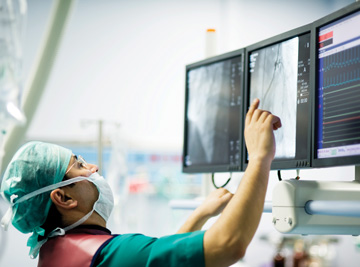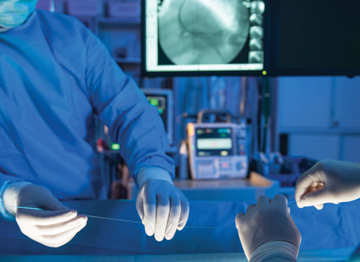Mr. Moore says moving cardiovascular procedures to ASCs provides many advantages for patients, including convenience and quality of care. “Based on ASC quality benchmarks alone, I had less of a concern of infection as opposed to the hospital
setting,” he adds.
The overall patient experience was overwhelmingly positive for Mr. Moore. “My cardiovascular surgeon and the ASC personnel were safe, communicative and efficient throughout my short procedure, brief recovery period and discharge,”
he says. “I was very pleased, yet not surprised.”
Mr. Moore has spent decades advocating for changes in outpatient care, and he admits that there can be challenges to establishing a cardiovascular ASC that is ultimately successful. “The ever-increasing regulatory compliance requirements
and receiving fair reimbursement are heavy burdens,” he admits.
Gregory J. Dehmer, MD, medical director for quality and outcomes at the Cardiovascular Institute at the Carilion Clinic in Roanoke, Va., says cardiac surgery centers are able to focus on enhancing patient care. “Patients facing heart catheterizations
used to be admitted to the hospital the day before they had the procedures done and remained until a day or two after,” he says. “Those days are long gone. Now, patients are likely ready for discharge four to five hours after procedures.
Patients would rather go home than be hospitalized.”
Outpatient centers offer efficient scheduling that enhances the patient experience and leads to cost savings, points out Dr. Dehmer. “You don’t have the same overhead at an ASC that you do in a hospital,” he says.
As a professor of medicine at the Virginia Tech Carilion School of Medicine, Dr. Dehmer spends a lot of time discussing the newest advances in cardiology with medical students. While much of the focus is on improving technology, he says there
are other considerations about when and where certain treatments are pursued.
Some caution is advised as more cardiology cases move to ASCs, says Dr. Dehmer, such as overzealous physicians who might try to treat at-risk patients in an outpatient setting. “A significant difference between performing procedures
in a freestanding facility versus a hospital,” he explains, “is that you have to transport patients who are having complications to an emergency department.”
Dr. Dehmer would like to see more data about the safety of cardiac care performed in outpatient facilities as opposed to hospital settings. “You have to follow the rules and be conservative about the patients you treat,” he explains.
ASCs are well known as quality, low-cost options for patients, physicians and payers alike. Freestanding ASCs were first developed by independent surgeons who wanted more control over when and how they could treat patients. But they faced some
challenges, such as being able to sustain these outpatient centers without a connection to a major hospital network, and being able to easily work with insurers and advisory groups.
Mr. Moore, who is doing very well after undergoing his cardiac procedure, says the patient experience, convenience and cost benefits still make outpatient centers a smart investment. “There are many advantages to being able to treat patients
safely in surgery centers,” he says. “Cardiology physicians in general are now realizing that.”
.svg?sfvrsn=be606e78_3)


.svg?sfvrsn=56b2f850_5)